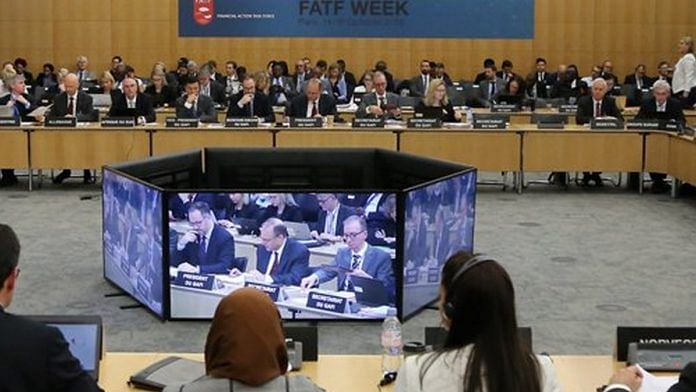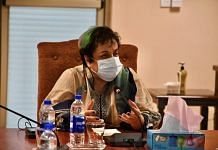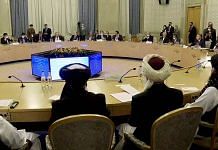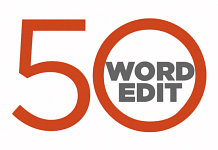
New Delhi: The Financial Action Task Force (FATF) announced Thursday that Pakistan will remain on its ‘grey list’, where it has been since 2018, and will now be joined by Turkey. This means increased monitoring on money laundering, terror financing and proliferation financing for these countries.
The FATF also expressed “its concern about the current and evolving money laundering and terrorist financing risk environment” in Taliban-controlled Afghanistan.
The announcements were made by FATF president Marcus Pleyer in a virtual press conference from Paris, at the end of FATF’s October plenary. The plenary is the highest decision-making body of the Paris-based terror-financing watchdog, and meets three times a year — in February, June and October.
Also read: Pakistan changes LoC strategy as winter approaches, terror launch pads full but ceasefire holds
Pakistan
On Pakistan continuing to remain on the grey list, Pleyer said “there is no discussion of blacklisting” since it has already completed 30 out of the 34 action items that were given by the FATF earlier.
However, Pleyer said Pakistan has to “demonstrate” that it has taken action and effectively prosecuted UN-designated terrorists, after being repeatedly asked by the FATF to take action on terror outfits such as Lashkar-e-Taiba (LeT) and Jaish-e-Mohammed (JeM).
According to the plenary’s report on Pakistan, the country has been asked to provide evidence that it “actively seeks to enhance the impact of sanctions beyond its jurisdiction by nominating additional individuals and entities for designation at the UN”.
In the June 2021 plenary, Pakistan was given some extra parameters to work on by the FATF. It had already initiated certain investigations, including on-site and off-site supervision of terror financing, increased prosecution of UN-listed terrorist outfits such as al-Qaeda, the Taliban, Haqqani Network, LeT, JeM, Jamaat-ud-Dawa (JuD), Falah-e-Insaniat Foundation and the Islamic State.
Turkey
On Turkey being put on the grey list, Pleyer said the country has made a “high-level political commitment to work with the FATF to strengthen the effectiveness of its anti-money laundering and countering the financing of terrorism mechanism”.
Pleyer also said a greater focus will be put by the FATF in monitoring “Turkey’s oversight of the NPO sector”, which refers to non-profit organisations, including their foreign branches.
“Turkey is urged to apply the risk-based approach to supervision of NPOs in line with the FATF standards,” Pleyer said.
Turkey has been one of the countries supporting Pakistan, apart from China and Malaysia, thereby saving it from getting blacklisted.
Also read: ‘Unholy’ China-Pakistan-Turkey-Taliban pact means India can’t rest, says RSS chief Bhagwat
Afghanistan
This was the first FATF plenary since the Taliban took over Afghanistan in August.
“In light of recent events in Afghanistan, the FATF, as the global standard setting body for anti-money laundering and counter-terrorist financing, expresses its concern about the current and evolving money laundering and terrorist financing risk environment in the country,” the body said in a statement issued especially on Afghanistan at the end of the plenary.
The FATF also asserted that the UNSCR 2593 (2021), which was adopted in August, had to be adhered to and that the “Afghan territory not be used to threaten or attack any country or to shelter or train terrorists, or to plan or to finance terrorist acts”.
Issuing a separate public statement on the financing of the Islamic State, al-Qaeda and their affiliates, the FATF said the “threat of terrorism remains serious in many regions of the world”.
“The FATF notes with grave concern a series of terrorist attacks recently in Afghanistan, Iraq and many other regions, including Africa and South Asia. These attacks, either claimed by ISIL (Da’esh) and its affiliated groups, or conducted by lone attackers inspired by them, have killed or injured hundreds, many of them innocent civilians. Meanwhile, al-Qaeda and other terrorist organisations continue to pose a serious threat to international stability, security and peace,” it said.
(Edited by Shreyas Sharma)
Also read: Many in US want America to disengage with Pakistan. That would be a mistake
Subscribe to our channels on YouTube & Telegram
Why news media is in crisis & How you can fix it
India needs free, fair, non-hyphenated and questioning journalism even more as it faces multiple crises.
But the news media is in a crisis of its own. There have been brutal layoffs and pay-cuts. The best of journalism is shrinking, yielding to crude prime-time spectacle.
ThePrint has the finest young reporters, columnists and editors working for it. Sustaining journalism of this quality needs smart and thinking people like you to pay for it. Whether you live in India or overseas, you can do it here.





